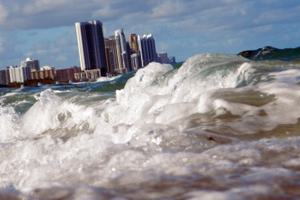Antarctica and the Arctic
-
For Vulnerable Barrier Islands, A Rush to Rebuild on U.S. Coast
Despite warnings from scientists, new construction continues on U.S. barrier islands that have been devastated by storms. The flood protection projects that accompany this development can have harmful consequences for coastal ecosystems being buffeted by climate change.
-
Fate of the Passenger Pigeon Looms as a Somber Warning
This September 1 marks the 100th anniversary of the death of Martha, the last known passenger pigeon on earth. The extinction of this once-abundant North American bird still stands as a cautionary tale.
-
A New Frontier for Fracking: Drilling Near the Arctic Circle
Hydraulic fracturing is about to move into the Canadian Arctic, with companies exploring the region's rich shale oil deposits. But many indigenous people and conservationists have serious concerns about the impact of fracking in more fragile northern environments.
-
Why Restoring Wetlands Is More Critical Than Ever
Along the Delaware River estuary, efforts are underway to restore wetlands lost due to centuries of human activity. With sea levels rising, coastal communities there and and elsewhere in the U.S. and Europe are realizing the value of wetlands as important buffers against flooding and tidal surges.
-
Loss of Snowpack and Glaciers In Rockies Poses Water Threat
From the Columbia River basin in the U.S. to the Prairie Provinces of Canada, scientists and policy makers are confronting a future in which the loss of snow and ice in the Rocky Mountains could imperil water supplies for agriculture, cities and towns, and hydropower production.
-
Life on the Mississippi: Tale of the Lost River Shrimp
The 20th-century re-engineering of the Mississippi River wreaked havoc on natural systems and devastated once-abundant populations of native river shrimp. Biologist Paul Hartfield has focused his work on studying these creatures, which were known for making one of the world’s great migrations.
-
Can Waterless Dyeing Processes Clean Up the Clothing Industry?
One of the world’s most polluting industries is the textile-dyeing sector, which in China and other Asian nations releases trillions of liters of chemically tainted wastewater. But new waterless dyeing technologies, if adopted on a large scale, could sharply cut pollution from the clothing industry.
-
Examining How Marine Life Might Adapt to Acidified Oceans
In an interview with Yale Environment 360, marine biologist Gretchen Hofmann discusses how well mollusks and other shell-building organisms might evolve to live in increasingly corrosive ocean conditions caused by soaring CO2 emissions.
-
On Fracking Front, A Push To Reduce Leaks of Methane
Scientists, engineers, and government regulators are increasingly turning their attention to solving one of the chief environmental problems associated with fracking for natural gas and oil significant leaks of methane, a potent greenhouse gas.
-
Scientists Focus on Polar Waters As Threat of Acidification Grows
A sophisticated and challenging experiment in Antarctica is the latest effort to study ocean acidification in the polar regions, where frigid waters are expected to feel most acutely the ecological impacts of acidic conditions not seen in millions of years.
-
How Rise of Citizen Science Is Democratizing Research
New technology is dramatically increasing the role of non-scientists in providing key data for researchers. In an interview with Yale Environment 360, Caren Cooper of the Cornell Lab of Ornithology talks about the tremendous benefits — and potential pitfalls — of the expanding realm of citizen science.
-
Greenpeace’s Kumi Naidoo on Russia and the Climate Struggle
In a Yale Environment 360 interview, the outspoken executive director of Greenpeace discusses why his organization’s activists braved imprisonment in Russia to stop Arctic oil drilling and what needs to be done to make a sharp turn away from fossil fuels and toward a green energy economy.
-
Solar Geoengineering: Weighing Costs of Blocking the Sun’s Rays
With prominent scientists now calling for experiments to test whether pumping sulfates into the atmosphere could safely counteract global warming, critics worry that the world community may be moving a step closer to deploying this controversial technology.
-
Rising Waters
How Fast and How Far Will Sea Levels Rise?
-
How High Tech is Helping Bring Clean Water to India
Anand Shah runs a company that is using solar-powered “water ATMs” to bring clean water to remote villages in India. In an e360 interview, Shah talks about how his company is using a high-tech approach to address one of India’s most intractable public health issues.
-
On a Remote Island, Lessons In How Ecosystems Function
Transformed by British sailors in the 19th century, Ascension Island in the South Atlantic has a unique tropical forest consisting almost entirely of alien species. Scientists say that what has happened there challenges some basic assumptions about ecosystems and evolution.
-
Should Wolves Stay Protected Under Endangered Species Act?
The U.S. Fish and Wildlife Service has stirred controversy with its proposal to remove endangered species protection for wolves, noting the animals’ strong comeback in the northern Rockies and the Midwest. It’s the latest in the long, contentious saga of wolf recovery in the U.S.
-
No Refuge: Tons of Trash Covers The Remote Shores of Alaska
A marine biologist traveled to southwestern Alaska in search of ocean trash that had washed up along a magnificent coast rich in fish, birds, and other wildlife. He and his colleagues found plenty of trash -- as much as a ton of garbage per mile on some beaches.
